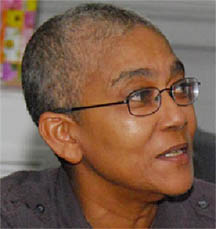Women’s rights activist Karen de Souza on Thursday made a call for an end to the “widespread” sexual harassment in the nation’s public service.
Testifying on behalf of Red Thread before the Commission of Inquiry into the public service, de Souza said workplace policies and enforcement of these policies will go some way towards addressing sexual harassment, which must be addressed as a matter of urgency.
The Prevention of Discrimination Act, de Souza said, recognises sexual harassment in law as unwanted conduct of a sexual nature in the workplace or in connection with performance or work which is threatened or imposed as a condition of employment on the employee.
“We have to have workplace policies which protect workers from this serious deviance. There are too many cases in which most often the female victim is transferred or bought off or made to leave the job. It is always the victim that pays because it is an offence which generally doesn’t have witnesses or people are afraid to speak,” de Souza stressed.

She also called for people to stop treating sexual harassment as a joke and reasoning “that is how men behave and women should feel flattered.”
Meanwhile, de Souza noted that an impartial public service, guided by rules and regulations, peopled by a professional staff with integrity and which is politically neutral, should be the overall goal.
She referenced Norway’s Ethical guidelines for Public Service (2005), which says that as exerciser of authority, provider of services and steward of significant social resources, the central government administration and thus the individual employee is obligated to take account of the public interest, to strive to achieve equal treatment and to treat individuals with respect.
“All Guyanese bitterly complain about the disregard, disrespect and contempt they are treated with when they try to access public services,” she, however, said. “We feel like supplicants,” she added.
de Souza further stressed that too many essential services, such as those of the National Insurance Scheme and birth and death registration services, are totally inefficient. This inefficiency, she believes, is a result of a “lack of training, supervision and guidance.” As a result, she said intensive training is needed.
de Souza also addressed the conditions under which public servants are made to work.
She attacked the “absurd requirement that public servants work for three months before they are paid.” This requirement, she noted, is inhumane and indecent, since it could not possibly take that long to process a few documents.
She also addressed what she believes are the ridiculous remuneration packages received by workers.
According to de Souza, the minimum wage is insulting and no worker can survive on $50,000. In fact, she noted that the recent increases for many workers “will not buy a loaf of bread and a piece of cheese.”
She further addressed allowances for public servants who are sent to interior locations, where they have no connections or support networks. According to de Souza, these “allowances are often late and, like everything else, inadequate.”
de Souza called for nothing within the public service to be taken for granted and urged that the rules and policies be put in place to offer protections where necessary.
The inquiry was set up by President David Granger to inquire into, report on, and make recommendations on the role, functions, recruitment process, remuneration and conditions of service for public servants.





